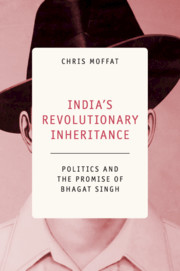2 - What Is to Be Done?
from Part I
Published online by Cambridge University Press: 21 December 2018
Summary
- Type
- Chapter
- Information
- India's Revolutionary InheritancePolitics and the Promise of Bhagat Singh, pp. 60 - 84Publisher: Cambridge University PressPrint publication year: 2019



